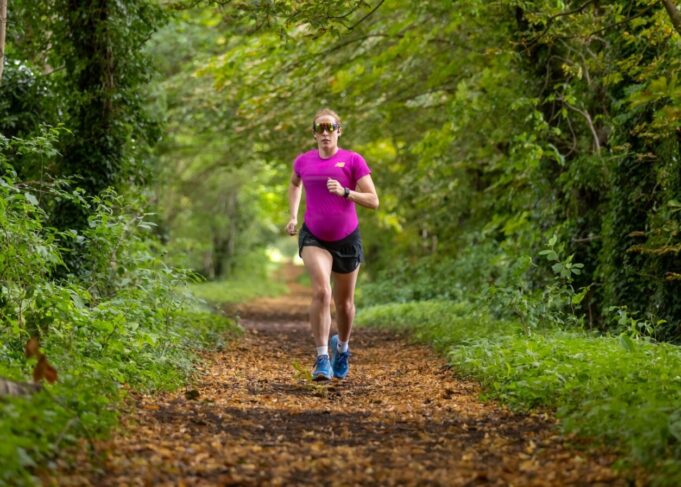With just a month until her due date, Jess’s eyes are still fixed on Paris 2024.
Jess Learmonth is best known for achieving Olympic gold as part of the winning triathlon mixed relay team at the 2020 Olympics in Tokyo. This September, she’ll have a new, tiny triathlete in the family, as she prepares to welcome her first child with partner Jon Wilkinson.
Historically, many female athletes have retired from sport when starting a family. This year Serena Williams announced that she’ll be retiring to expand her family, despite winning the Australian Open while eight weeks pregnant, then returning to the Wimbledon final just five months after giving birth.
Cultural norms and the physical demands of pregnancy are just two of the reasons why retirement is often the next step for female athletes starting families.
But Jess says she’s not storing away her tri suit any time soon.
“I actually got quite a severe injury and then we found out we were expecting, so it was a silver lining in a terrible time for me as an athlete,” said Jess.
Following a hip injury at the 2022 Arena Games Finale in Singapore last year, a recovery period was already on the cards for Jess. Then, via an Instagram post featuring a new born sized tri suit and a baby scan, Jess announced that the break would be extended.
“It’s actually worked out really well and the support I’ve received had has been fantastic,” she said.
“I’ve been very surprised at how the pregnancy has gone, how I’ve been able to continue training and how my body has reacted.
“Up until a few weeks ago, I’ve still been doing 25-28 hours a week of exercise so not much different to my usual training regime.
“There’s a stigma that when women get pregnant, they suddenly become fragile, they must rest and conserve their energy.
“While we’re all different and have individual needs, that’s simply not the case for a large proportion of women.”
Research from the NHS show that the more active you are during pregnancy, the easier it will be for you to adapt to your changing body, and it could also help you to cope with labour.
“The only difference has been that I haven’t been able to do hard efforts getting my heart rate above 150 bpm,” says Jess.
“I also avoid going out on the roads purely from a safety point of view, so that has impacted the distances I’m able to cover on the bike. I know that I’m doing the right thing for me as an athlete and for my body.
“It’s great to get it out there to other pregnant women that you can actually still be active in pregnancy, I think a lot of women are unsure what their limits are while pregnant.”
Looking ahead to life with a new addition to the family, and preparations for the Olympic Games in Paris next year, Jess said: “Right now I’m feeling confident about my ability to train and prepare as an athlete, but the birth will be the main factor.
“I’m aware that my body will change and potentially what I can do athletically will change too; for example, your core and your pelvic floor are both really important for running.
“Straight after the labour I’ll have to be monitored and reviewed quite a lot, so I don’t do too much too soon to prevent problems later on in life.”
While a new born is bound to take up plenty of Jess’s and Jon’s time and attention, Jess hopes motherhood will make her a better athlete.
“I think having children changes the mindset of a lot of athletes. It allows them to step back and see the bigger picture; they’ve got other things in life that are more important than that medal or that race, which you would think is detrimental because you’ve got to be selfish and motivated, but in a way it can help. I’ve seen it allow athletes to relax and learn to be more adaptable. Overall, I’m just excited to see how my body can perform after the birth, and also how I feel mentally. With any luck, loads of training and the unwavering support I’ve received from my family and sponsors, I’ll be back in fighting form ahead of the games next summer.”
Jess’s new arrival is due 15th September 2023, and all Olympic hopefuls must undergo a qualifying pathway to earn a spot for the Games via events that conclude in May 2024.
Listen to UKRunChat’s Michelle Mortimer interview Jess about her pregnancy and her training here:
Spotify: http://spoti.fi/2SeNDF7
Apple: http://apple.co/3fiJ0mJ






